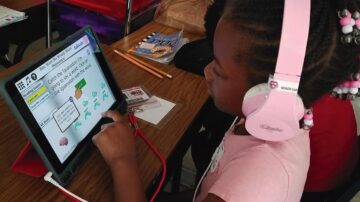Nina Pasquini in Harvard Magazine:
 Reading didn’t come naturally for Abigail, a seventh grader at a public middle school in Cambridge. “It was challenging when I started early on, when I was in kindergarten, learning the ABCs,” she remembers. English is her second language, Arabic her first, and when she was younger, the letters and sounds of English weren’t intuitive.
Reading didn’t come naturally for Abigail, a seventh grader at a public middle school in Cambridge. “It was challenging when I started early on, when I was in kindergarten, learning the ABCs,” she remembers. English is her second language, Arabic her first, and when she was younger, the letters and sounds of English weren’t intuitive.
By middle school, she could read individual words and short passages, but struggled to comprehend longer texts. Then, during sixth grade and the first half of seventh grade, she worked with literacy coach Emma Weinreich, Ed.M. ’19, who helped her to understand what she read. Abigail learned strategies for what Weinreich called “reading with a purpose”: asking herself questions before and after reading a passage, or watching relevant videos before tackling a text about an unfamiliar topic. Intervention also provided her a space to focus and receive one-on-one help, Abigail says. (To protect their privacy, Abigail and other students interviewed for this story have been given pseudonyms.)
Today, Abigail is out of intervention and reads at grade level. Her reading skills have not only made school easier, but provided her with new ways of understanding herself, other people, and the world. Her favorite part of reading is “imagining what’s happening in your head,” she says. This is why she prefers chapter books over graphic novels: she gets to direct the scenes. “Sometimes, I change the characters’ looks a little bit in my imagination,” she says. “I imagine them how I like. It makes reading books more fun for me, which is how I read a lot of books this year.”
Enjoying the content on 3QD? Help keep us going by donating now.
